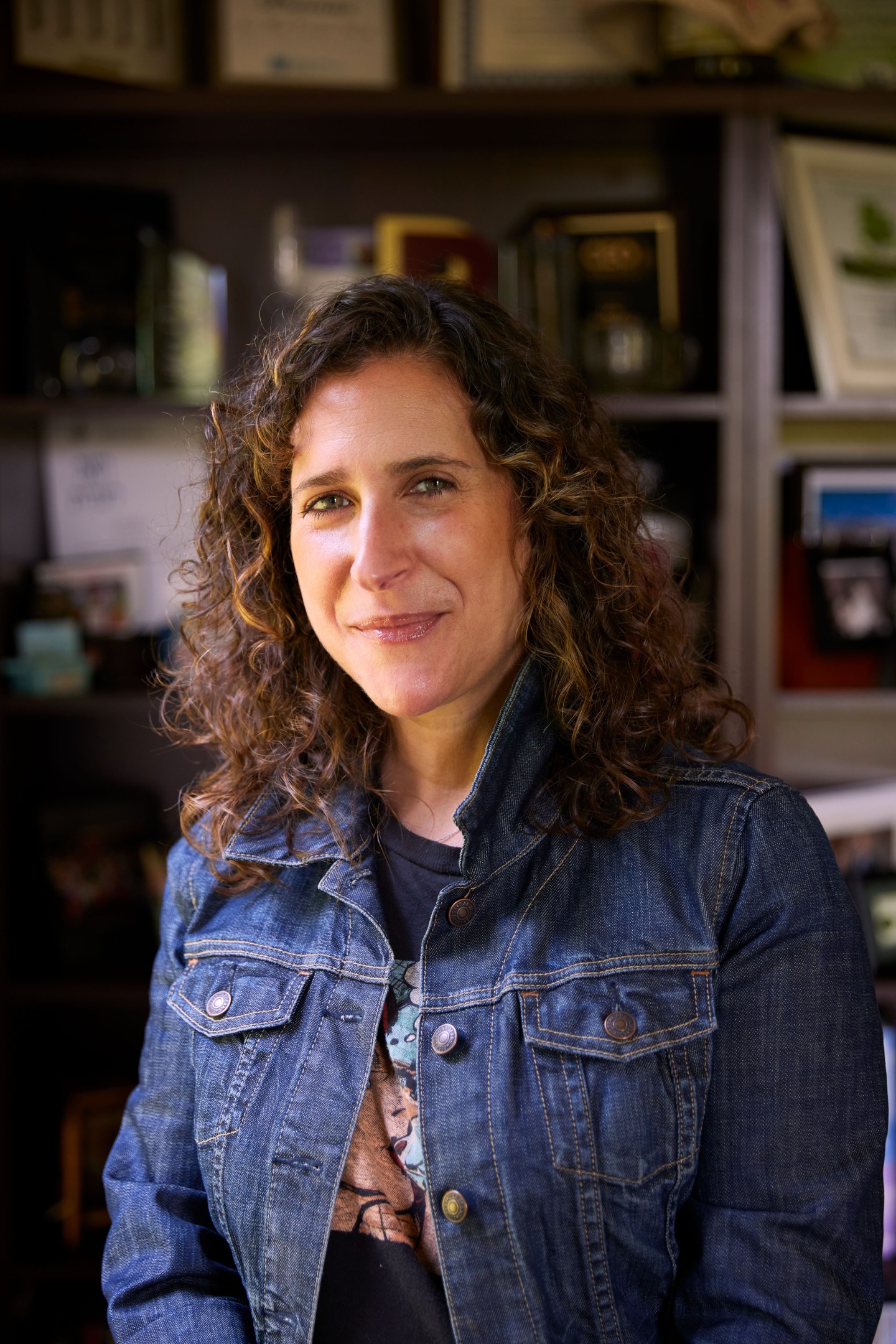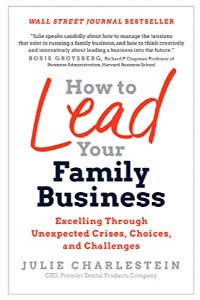Julie Charlestein: ‘Nepotism isn’t a good or a bad thing in a family business. It’s simply a fact’

Roula Khalaf, Editor of the FT, selects her favourite stories in this weekly newsletter.
Family is important to Julie Charlestein. That is evident when we speak over Zoom, and her spiral curls bob about as she sits in the back of an Uber while she takes her son to an appointment in the middle of the working day. Mercifully, she moves to stable ground just as I am on the brink of motion sickness.
The 50-year-old owes her livelihood to her family because Charlestein is chief executive of the family business, Philadelphia-based Premier Dental Products, a global provider of dentistry products. She is the fourth generation to lead the company, founded by her great-grandfather in 1913, and the first woman. She declines to disclose sales figures but says the private group is profitable.
It is the topic of her new book, How to Lead Your Family Business. In it, she writes of being the “grateful beneficiary of that old business tradition known as nepotism”. Many of America’s companies are run by nepo babies (to use the Gen-Z coinage), from mom-and-pop stores to huge businesses such as Mars, News Corp and Walmart.
According to the Family Business Network, which represents family-run companies, they account globally for “two-thirds of businesses, employ 60 per cent of the work force and contribute more than 70 per cent to global GDP”. There is huge diversity, says Charlestein: “If you’ve seen one family business, you’ve seen one family business.”
Family business is also the stuff of high drama. When we speak, Succession, the hit television show, is closing its fourth and final series amid feverish speculation. It seems fanciful to compare the fictional multibillion-dollar Roy media empire with a company that makes surgical scissors and teeth whitening products, with about 140 employees and sales in 75 countries. But Charlestein says family businesses can have a “lot of dysfunction. There certainly is drama. There are certainly a lot of different dynamics than you would find in other types of businesses”.

Her book covers the highs and lows of family businesses: from clarifying whether to join in the first place and gaining expertise to hiring and firing, and the potential for dysfunction. Dealing with nepotism in the book straight off was important to Charlestein. “Is [nepotism] how I originally ended up here?” she says with a rhetorical flourish. “Yes. But certainly, to ascend to a leadership role, nepotism shouldn’t be involved. It’s the foot in the door . . . Nepotism needs to go hand in hand with capability, achievement, competence.”
This urge to show you are up to the job can create stress. In her book, she writes of “an intense pressure to prove myself — to earn my reputation and to demonstrate that I have what it takes to lead the company my family created and not to be the one that fucks it up”. The many times she describes herself as a type A personality shows that this is something she is keen to impress on the reader, too.
Charlestein is all too aware of entitlement. She was recently speaking at a family business conference and a young woman said that she felt guilty about nepotism and her privilege. “I said, ‘You know, nepotism isn’t a good thing or a bad thing in a family business. It’s simply a fact.’”
There was no pressure to join the family business. “I never had an objection to coming into it,” she says, smiling — her perfect teeth an advertisement for the business. “It was just never something that I really wanted to do.”
After studying political science and Judaic language and literature, Charlestein went to work at the American Israel Public Affairs Committee, a pro-Israel lobby in Washington, and then in telecoms before joining the company part-time when her father, Gary, was CEO. There, she discovered, she enjoyed the work. So, in 2002, she went full-time before deciding to go to business school to learn more about finance and operations, and then moved into the business development side. In 2013, she was promoted to president and, three years later, succeeded her father as CEO.
This path to the top was hardly straightforward. In the book, she writes: “It would be a mistake to assume that my leadership journey has been a smooth and easy one. Quite the opposite. My family is a fun-loving and lively bunch of people, whose occasional dysfunctions (including my own) are part of the charm. Family dramas can be the most intense dramas of all.”
Unlike the fictional Roy family, she says she has no tensions with her two siblings, only one of whom is “peripherally involved in the business — he does travel and events”. They have no desire to lead the business, she says. “It’s just not something at all that interests them. They see it as, ‘That’s kind of like Julie’s gig.’”
One of the greatest difficulties has been maintaining a professional relationship while going through personal friction. “There have been periods where [my father] and I might not be getting along. There could be significant conflict. Yet we’re together every day with team members in the company.” She restates it bluntly: “If everything is going really well, it’s a very convivial, collegial relationship. You know, he’s my boss, but he also happens to be my father. If things aren’t going well, he’s my boss. And can you believe he’s also my father?”
The episode in the book that stood out to me was her father undermining her after she had overseen a difficult meeting about corporate governance. She wrote: “As I spoke, there were smiles and nods around the table. But my father simply turned to me, his face blank, and said, ‘That’s great, Julie. Now go pick out a dress for your grandmother to wear to dinner tonight.’”
In one blow, her father diminished all her professionalism and forced her back into her role as a dutiful daughter. Has she ever confronted him? “I haven’t actually spoken to him about it,” she says. “And he didn’t say anything about it when he read the book.” At the time, it “had definitely an impact on me”.
She has been surprised — and maybe vindicated in her feelings — by the reaction to that story. A male friend who read the manuscript said he was much struck by it, making him appreciate that the way his parents’ treatment of his sisters was different from their attitude to him.
Perhaps her father’s attitudes were also shaped by the fact that Charlestein is part of the first generation of women in her family to have a working life outside the home. “There was a little bit of surprise, at least on my father’s part, that work continued to be an important part of my life once I had children. He was just concerned more for my mental health or my exhaustion.”
She and her husband, who is not involved in the family business, relied on outside help. “We had nannies. It wasn’t just the two of us. I could not have done it without that.”
External help is important, not just at home but also at work. Throughout her time at Premier Dental, she has sought the advice of mentors with experience in the peculiar dynamics of a family business, and she worked with a consultant who was also a therapist. “I wanted to have someone who would have an understanding of what that dynamic was. It’s not like, ‘My boss is a pain in my ass’ when my boss is a pain in my ass and he’s my dad. So what are we going to do about that? Therapy is invaluable. Unfortunately, it’s still stigmatised. I don’t know why. I love it.”
With so much potential for tension, would she want her own children to work in the business? At this stage, she says, there are no plans for them to do so — her daughter is 20 years old with aspirations to be a veterinarian, while her son is graduating from high school with dreams of becoming a chef. But “it certainly is something that is very much on their radar and is discussed often. If they want to. I would love it. It’s a wonderful opportunity”. However, she is not “opposed to” her job passing to someone outside the family.
To Charlestein, it is important that her children do something else before entering the business. “I would be insistent on it . . . [For] a lot of families, it’s actually mandated. Different families handle it differently. Some are the exact opposite. They want the kids in it from the beginning and really having the most deep understanding as possible.”
Working elsewhere is about not only gaining vital experience, but also the optics. “It really puts you in a different light in the eyes of the company and also the industry, whatever industry you’re in.”
If her children do decide to join, she will devise some kind of curriculum so that they get exposure to all parts of the business.
Charlestein hopes readers of the book will understand the importance of family business. The values, she says, helped steer the company through the turmoil of the Covid pandemic, which saw them furlough staff and then make redundancies. In the first three months when the virus hit, sales were down by 95 per cent before coming back steeply.
“You have the capability to have a longer-term view. You have more control over your finances and how you utilise money. So I think that those are beneficial at all times and were certainly heightened during the pandemic.”
Ultimately, family business is a mixed blessing. “The stewardship and evolution of the family name and the legacy and purpose — that is such a tremendous privilege, [but] it is also an unbelievable amount of pressure.”
How to Lead Your Family Business: Excelling Through Unexpected Crises, Choices, and Challenges by Julie Charlestein, Matt Holt Books, £20.99
This article is part of FT Wealth, a section providing in-depth coverage of philanthropy, entrepreneurs, family offices, as well as alternative and impact investment
Comments